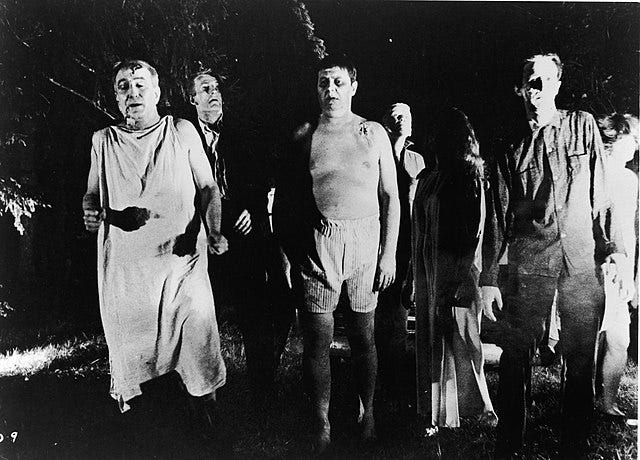Sunday e-mail 11th August: Solitary confinement
Night of the Living Dead: What we think about when we think about nothing
Living, as I do, in a university town, I am forever bumping into other pedestrians. Or, rather, they are forever bumping into me. By which I mean, I stand still, cross my arms and look at them sarcastically while they mumble and shift out of the way.
You may have had the same experience if you live in a university town, or major metropolis. You know the cause, too. You know what I am talking about. I’m talking about phones. And earbuds. Them especially.
Like most people, I am trying to learn Swedish. How are you getting on? Me, I’m not sure the learning process is going too well. Don’t listen to anyone who tells you Swedish is easy. They are charlatans who are just after your money. Also, my brain is not in practice for learning. It has been otherwise engaged lately.
Sometimes I think how useful it might be to listen to my favourite Learn Swedish podcast while I am walking down the road, say, or picking up my groceries. But so far I’ve always managed to resist the temptation.
Think about Thomas Silverstein. Or don’t. He is unpleasant to think about: an armed robber, heroin dealer, white supremacist, and murderer. Said the Bureau of Prisons director, ‘I don’t know what else could have been done to prevent further violence by a man who had nothing to lose’. And, no, neither do I. The fact remains, though, that you don’t know what you are going to get when you sentence a man to solitary confinement with ‘no human contact’. Or, rather, you do: you get a tiny, useless, uncontrolled study into the furthest reaches of human psychology.
With no one to remind him what reality was, with no human facial expressions to interpret, or opportunity to interact, with lights on 24 hours a day and no way to tell day from night, Silverstein was hardly going to get better. ‘No great loss to the world,’ you might say, and I might agree – but one has to wonder at a system that can allow a convict to endure a nightmare the outcome of which no one can possibly predict in advance. Indeed, only one element in this scenario is predictable - Silverstein’s bland, uniform, stimulation-free environment.
Earbuds work on a tinier, tinier scale. They leave us with our everyday experiences but, well, they subtract the world from it. They are another way – as if we postmodern human beings needed more of them – to insulate ourselves from the world. They somehow achieve the impossible in making the world less relevant. They help smooth out our everyday lives, too. Not in a good way. You and I should hear things we don’t want to hear; we should deal with interactions we never chose; we should occasionally swap the world inside world for the one outside
.
Our brains are designed to solve problems. They are very good at it. But they do need problems to solve – otherwise they end up inventing them. ‘First world problems’ – remember that phrase? – you know where they came from. They were invented by people whose brains were not in proper use. Have a glance at your social media feed. See any first world problems? I can see plenty on mine. And now we know how to fix them.
This week’s great Crime & Psychology newsletter is precisely about thinking. Last year I wrote a newsletter called WHAT WE THINK ABOUT WHEN WE THINK ABOUT CRIME. It proved to be one of the most popular in the entire illustrious history of our newsletter. I figured a little more such material might be welcome. And boy do I have some great material for you! Besides, I love writing about mental shortcuts and heuristics just as much as you love reading about them.
You don’t have too long to wait, Crime & Psychology fan. The newsletter will be hitting your e-mail inbox on Wednesday. If you are bored, a good way to pass the time till then is to bang a blue button. Or two. Every button you bang helps keep this newsletter going.
Thank you! See you Wednesday!
‘Night of the Living Dead’ image courtesy of WikiMedia Commons.






Thoughtful. Thank you. Looking forward to Tuesday’s essay.
I am an ear bud addict, so I needed to hear this. No pun intended.